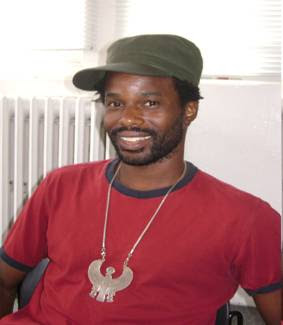Becoming a Better Dad

One man’s pledge to end the cycle of distant parenting
"How are you going to nurture your child if you're not nurturing yourself?"
From the Midtown Community Court's Dads United for Parenting (D-UP) program...
“This is really serious, what’s happening with men who are fathers is a crisis,” comments Eddy James, a recent graduate of the D-UP program. “Dads are accepting their distant behavior as normal, but it must be examined and prevented because it trickles down to create other social ills.” Throughout the six-week program, Eddy worked with other adult non-custodial fathers four days a week engaging in fatherhood oriented services including job training, financial planning, parent skills training, and planned family activities. D-UP targets key parental behaviors and beliefs, and the structure and content helps fathers progress towards the goals of financially and emotionally supporting their children.
Click here to read more...
Eddy was 24- years-old when he found out that he and his girlfriend were going to have a baby. Despite difficulty with family and friends, they tried to stay together for their new daughter, Faith. But eventually the strain from his girlfriend’s disciplinary parents - a term he references from D-UP’s Nurturing Fathers curriculum - became overwhelming and around the time Faith was 3-years-old her parents found themselves in a torturous relationship and living in the shelter system.
Faith and her mother secured a supportive housing unit, but because of the increasingly tumultuous relationship between Eddy and Faith’s mother, he found himself displaced from their residence and a victim of the biased shelter system whose structure places the child with their mother.
By the time Eddy entered the single men’s shelter, he wore only 130 lbs. on his 6ft. frame and came to the striking realiztion that “I wasn’t seeing myself.” Amid this discovery, Eddy chose to “black out” on Faith and her mother to get a handle on his emotions. But he was still mired in the murky depths of his anger with Faith’s mother, until another resident at the men’s shelter made him realize that his misdirected focus was prohibiting him from doing what was important – rebuilding his life for his daughter.
Equipped with a newfound self-awareness, Eddy was forced to learn about public assistance as he himself navigated the daunting system and subsequently helped others through the process. “Through doing you receive,” he recalls. Meanwhile, Eddy began writing poetry as a catharsis and sought work in social services to help others. “I felt lighter,” he says.
Restored to health – physically and emotionally – Eddy was granted joint custody in family court. Through his Saturday visitation schedule, Eddy and Faith reuinted and maximized their time together by exploring facets of New York City. Eventually Eddy escaped the shelter system and obtained his own apartment. But even with his successes, Eddy reports that the imbalance with Faith’s mother persisted: She would sabatoge his scheduled visits with Faith while Eddy struggled to maintain a relationship with his daughter. After a long battle with Faith’s mother, Eddy’s situation culminated when he found himself entangled in the family court system, and the Administration for Children’s Services.
Eddy, now a 35-year-old producer and editor, was referred to D-UP by the court and naturally felt resistent to the idea of someone questioning his parenting skills. Upon being referred to the program Eddy recalls thinking, “I don’t need this, I’m a good dad.” But his resistence turned to curiosity, and Eddy’s recalcitrance eventually morphed into active participation and group leadership.
“This is how grown men get down,” Eddy says. “How are you going to nurture your child if you’re not nurturing yourself? There are so many external expectations
placed on us, but the program makes you reflect internally. And men don’t really talk in a sense of their feelings, but D-UP get’s you to be solid and to talk.” Because of the mutual trust and bond that was formed between the men during the six-weeks, Eddy felt that “It was okay to cry.”
Throughout the Nurturing Fathers curriculum, Eddy learned to reflect on his father’s parenting style, and identify similar traits in his own. “I began to recognize my distant style in my father’s, and decided that I didn’t want to be like that with my daughter,” Eddy says. “Before, maybe none of us thought we needed the program, and that being a non-emotional man is normal, but we can benefit from tweaking our fathering style and examining ourselves and the decisions we have made. And the planned family activities help dads realize other things they can do with their kids.”
In August 2008, Eddy graduated from D-UP with a proud supporter by his side – his daughter Faith. As a result of the program, Eddy admits that the communication has improved because he is listening better, explaining more and being patient with her. “I’m showing more of myself to her,” declares Eddy.
Still, Eddy wants to give back to his community and cease the cycle of distant parenting. After participating in D-UP, Eddy is more cognizant of absent young fathers in his neighborhood, and can predict the looming cycle that they are about to embark on. “It’s always the same story: new baby, mama drama and then, court case.” And Eddy knows, this will only result in more removed dads who perpetuate distant parenting. Eddy hopes to volunteer for a fathering program in his own neighborhood so he can help other dads like him, transcend the viscious cycle and become better dads.
Comments